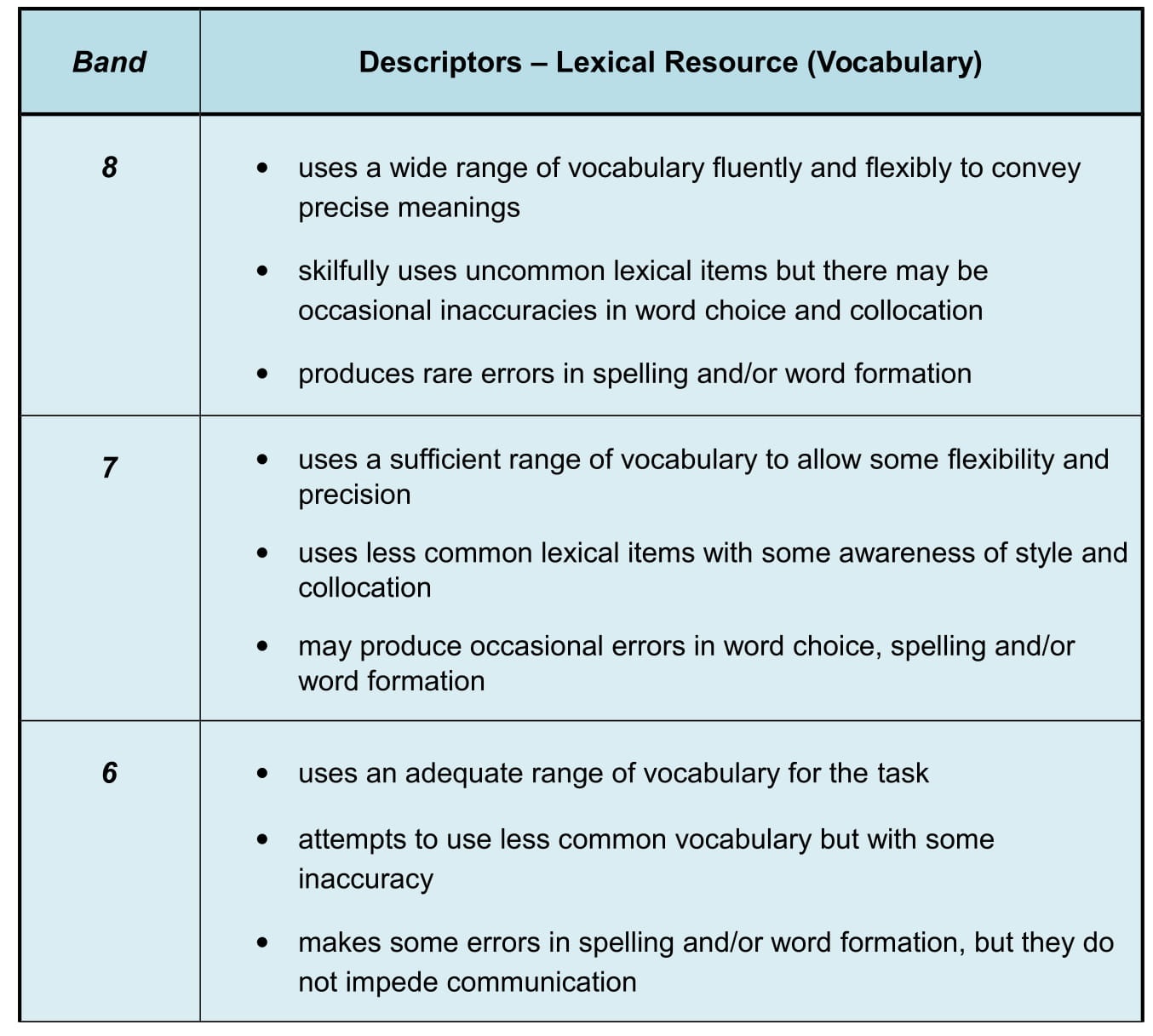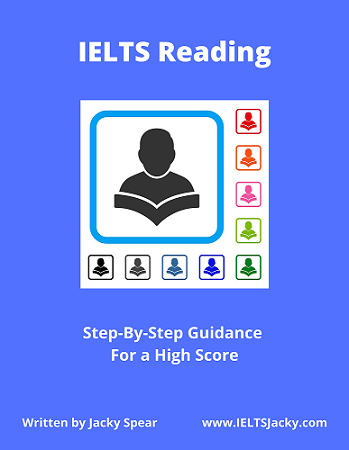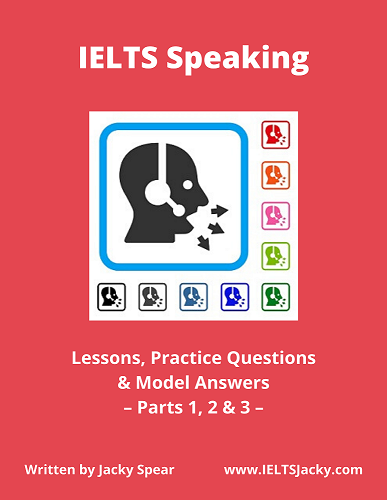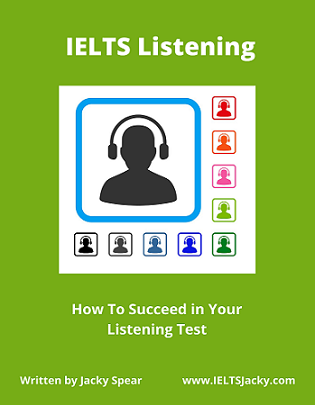Academic
IELTS Task 1
–
Vocabulary for Task 1 Essays
–
As with all parts of the IELTS exam, Academic IELTS Task 1 is assessed on four criteria. We looked at the first two, Task Achievement and Cohesion and Coherence, on the Task 1 overview page (IELTS Academic Writing Task 1) and it’s now time to focus on Vocabulary.
This lesson includes:
1) Understanding the marking criteria
2) Key vocabulary for Academic IELTS Task 1:
- Adjectives & adverbs
- Verbs & nouns
- Collocations
- Other useful phrases
- Percentages, proportions & approximations
3) A word list PDF to download.
Understanding the Marking Criteria
Before we start looking at the specific vocabulary you will need for your IELTS Task 1 essay, it’s essential that you understand how vocabulary is assessed. Vocabulary, also called Lexical Resource, carries 25% of the marks so, you need to know what the examiner is looking for.
We’re going to focus on Bands 6 - 8 as these are the levels most students are aiming for. Here are the official marking criteria for Vocabulary. Don’t worry if you don’t fully understand them. I explain the main points below. If you follow my guidance in this lesson, you’ll be able to meet these criteria and get a good score for IELTS Task 1.

You can see a full table of all the band level marking criteria for Writing IELTS Task 1 by clicking this link – Task 1 Marking Criteria.
The marking criteria for vocabulary can be summed up in a single sentence:
- Vocabulary (Lexical Resource) is the ability to use a range of appropriate vocabulary and to use it correctly.
Of course, there’s more to it than that and there are three key things you need to do to get a high score for vocabulary. Correct spelling is obviously essential so I won’t say any more about this.
1) Use appropriate vocabulary
In your Task 1 essay, you will be describing data and this requires some very specific vocabulary that you might only use in this part of the exam. This is what the marking criteria are referring to when they mention ‘precise meanings’ and ‘less common lexical items/vocabulary’.
You’ll find lists of useful Task 1 specific words below.
2) Use vocabulary flexibly
You need to have a wide enough range of vocabulary that you can say the same thing in more than one way, that is, paraphrase. This is what the marking criteria mean by the phrase ‘allow some flexibility and precision’. You do this by using synonyms.
Paraphrasing also involves using different sentence structures, which I cover in the lesson on Grammar for Academic IELTS Task 1.
3) Use collocations correctly
The marking criteria specifically mention the correct use of collocations as something you'll be assessed on.
A collocation is a combination of two or more words that sound correct to a native speaker when used together. The word combination often doesn’t work if you try to replace the first word with a synonym. For example, we say,
- heavy rain but not weighty rain
- fast food not quick food
- keen interest not eager interest
My advice here is to only use collocations you are 100% sure are correct. These are something to focus on when learning vocabulary and I include some Task 1 related examples in the word lists we’ll now focus on.
Key Vocabulary for Academic IELTS Task 1
Adjective & Adverbs
In your IELTS Task 1 essay, you are required to describe what you see in a chart, graph, table, map or a diagram, most especially, to record changes in the data. To do this, you will use describing words, that is, adjectives and adverbs.
- Adjectives are words that describe or modify nouns or pronouns.
- Adverbs are words that describe or modify verbs or adjectives.
Adverbs can generally be formed by adding ‘ly’ to the end of the adjective.
Here is a table of adjectives and adverbs relevant to Task 1 questions. Don’t try to learn them all. This is only a very short essay (min. 150 words) so you won’t be able to include much detail.
Learn 2 or 3 words for large changes and 2 or 3 for small or moderate changes.
Large Changes:

Small or Moderate Changes:

Verbs & Nouns
You will also need some specific verbs and nouns.
- Verbs are words that describe an action or state.
- Nouns are words that refer to a thing, a place, a person or a quality.
Many words have a verb form and a noun form as can be seen in the tables below.
For your essay, you should learn 2 or 3 words for upward movement, 2 or 3 for downward movement because you will probably have to write about changes in data.
Upward movement

Downward movement

The following words can be used to describe both upward and downward movements.

Finally, you will need a couple of phrases to describe situations that show little or no change.

Remember to use the appropriate verb tenses in your essay.
Collocations
Many of the words in these lists can be formed into collations that are ideal for expressing change.
There are two ways that you can create them:
- Verb + Adverb
- Adjective + Noun
Here are some examples:

Again, don’t try to learn them all. Just pick a couple that you feel comfortable using.
The following sentences illustrate how you might use some of this vocabulary in an IELTS Task 1 essay.
1) The price of houses went into sharp decline between 1980 and 1985 but increased significantly from 1986 to 1990.
2) Over the whole time period, there was a steady growth in the number of women choosing to study part-time but for men, the level fluctuated.
Other Useful Phrases
Here are a few more phrases that you may find useful.

Percentages, Proportions & Approximations
All chart, graphs and table in IELTS Task 1 questions contain numerical data. You will gain marks if you are able to vary your language when you present this numerical data in your essay. Using approximations and proportions are an ideal way to do this, so we’ll start with these as they are useful for all types of IELTS Task 1 essay questions.
Approximations

Often, numerical data is expressed as percentages and you can use approximations to present this form of data in a different way. Here are some examples:

I’ve created
a PDF of these word lists. Download it here: Task 1 Vocabulary PDF
You now have more than enough vocabulary to write a high-scoring Academic IELTS Task 1 essay. Use the lists when you practice writing Task 1 essays. You'll soon become familiar with the vocabulary and this will help you to choose which words and phrases to learn fully and memorise.
You’ll also find some useful vocabulary for making comparisons on this page:
Grammar for Academic Task 1 Essays
And, there’s a lot more help with Task 1 in the lessons in the menu below.
Want to watch and listen to this lesson?
Click on this video.
IELTS Task 1 (Academic) – All Lessons
IELTS Academic Writing – A summary of the test including important facts, test format & assessment.
Academic Writing Task 1 – The format, the 7 question types & sample questions, assessment & marking criteria. All the key information you need to know.
Understanding Task 1 Questions – How to quickly and easily analyse and understand IELTS Writing Task 2 questions.
How To Plan a Task 1 Essay – Discover 3 reasons why you must plan, the 4 simple steps of essay planning and learn a simple 4 part essay structure.
Vocabulary for Task 1 Essays – Learn key vocabulary for a high-scoring essay. Word lists & a downloadable PDF.
Grammar for Task 1 Essays – Essential grammar for Task 1 Academic essays including, verb tenses, key sentence structures, articles & prepositions.
The 7 Question Types:
Click the links below for a step-by-step lesson on each type of Task 1 question.







